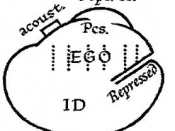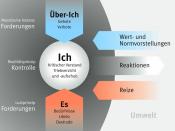"The Lord of the Flies" by William Golding is a social experiment with a twist. It is executed by isolating young boys on a deserted island. They arrive on the island because their airplane was shot down while they were trying to escape a bombing in England. The boys are young so they have not been completely molded by society; therefore they have room to deviate quickly. The isolation removes the blinders of civilization and the true identity of the boys and human nature is revealed. If the reader uses a Freudian approach to reading the novel one will find that Golding's characters and conflicts follow Freud's theories of the id, ego, and superego, thus making them more understandable. Studying the Freudian theory allows one to see Jack as the id, Ralph as the ego, Piggy and Simon as the superego, and why they clash.
The famous psychologist Sigmund Freud developed a theory that uses people's personality traits to classify them into three different categories of id, ego, and superego.
Although every person contains all three of the forces, one can dominates. "For Freud, we are simply actors in the drama of our minds, pushed by desire, pulled by conscience" (Understanding the Id, Ego, and Superego in Psychology). This theory allows one to realize that people tend to exhibit behaviors of their category. The id is the primal force of desires and needs. Impulse is controlled by the id. It can be compared to the devil on the shoulder of cartoon characters, and Mr. Hyde. Some people do not keep the id in check so it dominates their personality. Signs of the id are forceful speech, physical expression, and emotional outbursts. The ego is the mediator between the id, the superego, and the external world. Ego is the...


